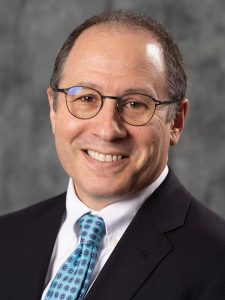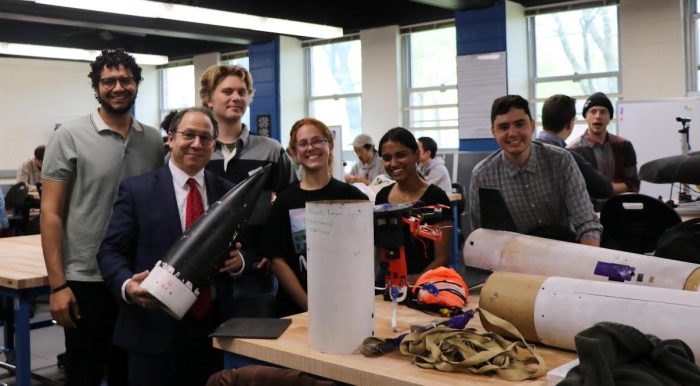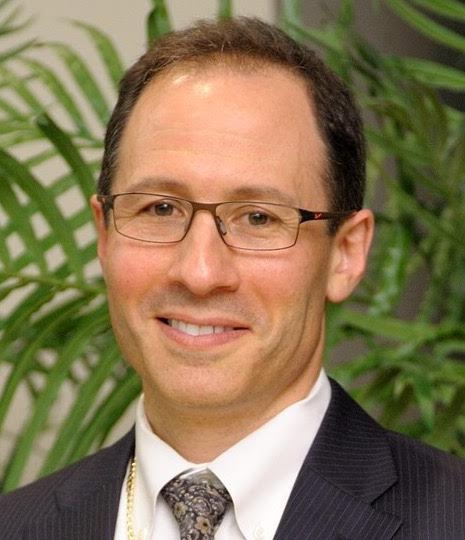By Daniel Dunaief

Andrew Singer, the Dean of the College of Engineering and Applied Sciences (CEAS) at Stony Brook University, has bigger numbers in mind. For starters, he’d like to see CEAS increase in size, from 5,000 total students, including 3,500 undergraduates, to as many as 10,000 students.
“We are small as an institution compared to other institutions of our reputation in research,” said Singer, referring both to the overall population of the university and to the college he leads.
He believes growth at the CEAS could occur because there is “that much demand for a Stony Brook College of Engineering and Applied Sciences education right now.”
Singer, who joined Stony Brook in July of 2023, believes that state schools like Stony Brook provide an education that create life changing opportunities for people and their families. The lack of available housing on campus at this point is a rate limiting step in increasing the number of students who can attend.
Getting the word out
Singer, who came to Stony Brook after 25 years in the Electrical and Computer Engineering department at the University of Illinois, believes public universities have historically seen themselves as being local and serving the mission of the state, without needing to advertise.
“As public funding diminished, many public institutions realized they needed to tell the world that they were serving this tremendous mission and adding tremendous value to society,” Singer said.
Indeed, the late Chemistry Professor Paul Lauterbur helped invent the MRI machine, which has become such an important diagnostic tool in medicine. Lauterbur, who was a tenured professor at Stony Brook from 1963 to 1985, shared the Nobel Prize in Physiology or Medicine along with British Physicist Sir Peter Mansfield in 2003.
Singer also wants prospective students to know that John L. Hennessy, the former president of Stanford University and current chairman of Google’s parent company Alphabet, earned his Master’s and PhD degrees from Stony Brook.
“Telling our story not only can help to bring some of the world’s greatest educators and researchers to campus, but can also ensure that the resources needed to continue to build on our successes are available,” said Singer.
Finding funds
Additionally, the CEAS Dean believes professors in the college can diversify their sources of funding.
“One of the things I noticed at Stony Brook is that most of the research is funded through grants from the National Science Foundation, the National Institutes of Health and the Department of Energy,” he said. “That concentration of funding makes you vulnerable to changes in the funding cycle.”
Additionally, competition for funding from those agencies is extremely high. Singer has been urging faculty at CEAS to seek funding from industrial sponsors.
“At the end of the day, what’s important is the scholarship you create,” he said.
Singer appreciates how his colleagues at Stony Brook are pursuing funds for larger interdepartmental funds.
Vice President for Research Kevin Gardner has “strong experience in building these larger portfolios of funding for faculty research,” Singer said. Gardner and Singer talk “often about ways we can continue to develop opportunities for faculty to go after new funding and present ideas to industry.”
Gardner described Singer as a “rock star” who has “great ideas” and is “super brilliant with tons of positive energy. He can move things and already has been moving things in a positive direction for CEAS.”
Gardner believes engineering could and should be twice the size it is and suggested that Singer is “the guy who will get us there.”
Opportunities for growth
Singer appreciates the depth and breadth of faculty interests at the CEAS. “Our faculty are brilliant researchers, working at the forefront of many areas of importance to society, from information and energy systems, to human health and disease prevention, to clean water and security,” he said. “With nine departments in the College of Engineering and Applied Sciences, it is difficult to find an area of science and engineering where our faculty are not having impact.”
Singer sees opportunities for growth in areas including artificial intelligence.
The university launched the AI Innovation Institute (AI3) in September of last year, which will expand the Institute for AI-driven Discovery and Innovation, which was established in 2018 from a department-level institute within the CEAS to the university-wide AI3, reporting to Provost Carl Lejuez. Steve Skiena, distinguished professor in the department of Computer Science, is serving as the interim director of AI3 while the university has been searching for an inaugural director.
The provost appreciates the efforts Singer has been making on behalf of the CEAS and the university. Singer is “good at thinking about the big things we need to focus on,” Lejuez said in an interview. Singer has “brought a leadership style that is consistent with the culture we’ve been trying to create over the past few years. We are partners with faculty, staff and students. We are including them not just at the end of decisions.”
Singer is also continuing to pursue his own scientific studies. His research interests include signal processing and communication systems. He has worked on underwater acoustics, where he studied underwater communication for the subsea industry. He has also worked in wireless communications for cellular and radio applications and in fiber optic communication systems.
Singer has two graduate students at Stony Brook and several students who are completing their work at Illinois. His students are working in areas related to audio signal processing, such as improving the performance of hearing aids and devices like noise-cancelling headphones, as well as in underwater acoustics.
Singer has had two companies emerge from research in his lab. He would like to continue to engage in innovation and entrepreneurship and help grow the entrepreneurial ecosystem at Stony Brook.
Quantum work
CEAS has invested in areas related to quantum communication.
In August 2024, Stony Brook was chosen to lead a project in the National Quantum Virtual Laboratory program. Funded by the National Science Foundation and led by Principal Investigator Eden Figueroa, Stony Brook Presidential Innovation Endowed Professor, the team is designing and implementing a 10-node quantum network connecting labs at Stony Brook, Brookhaven National Laboratory, Columbia University and Yale University.
Stony Brook held a workshop on Quantum Information Science and Communication systems in Manhattan that Figueroa led, in which some of the foremost experts in the field presented their work and discussed collaboration opportunities with Stony Brook, Singer explained.
Stony Brook has its “local and global strengths.” Singer wants to focus on building on those areas and to have SBU becoming well known to students and faculty as a destination of choice.







